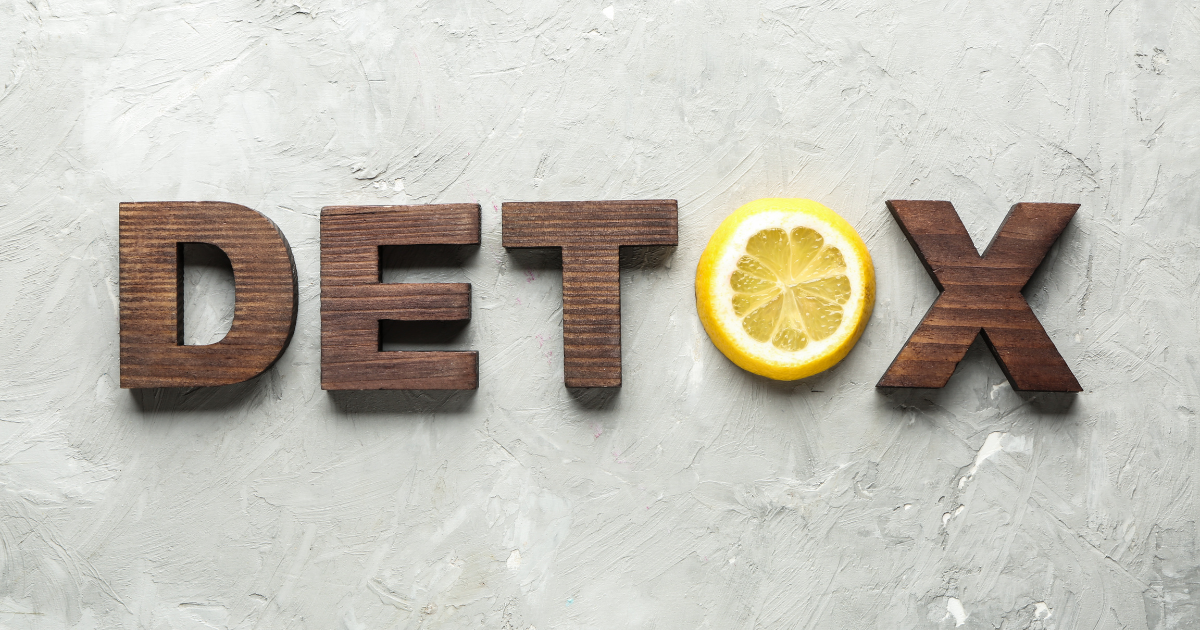Updated: July 21, 2023, at 12:13 p.m.
Navigating withdrawal: What foods should you eat during alcohol or drug detox?
Maintaining a healthy diet and drinking plenty of fluids are two ways that can help make detox easier to manage. Repeated substance abuse can damage the digestive system, making it harder for the body to break down food and absorb key nutrients. Once a person stops doing drugs or drinking alcohol, detox is their body’s way of healing itself. However, without plenty of fluids and nutritious foods, the withdrawal symptoms during drug and alcohol detox can cause the body great discomfort.
Drinking plenty of fluids and eating the right foods during detox are both ways to help a person’s body improve the effects of their addiction. In the event that you don’t choose to detox at a rehab center, it’s especially important to manage withdrawal symptoms with good nutrition to avoid further complications. However, if your symptoms worsen or last longer than normal, immediately seek out help from a medical professional.
What is detox?
Detox is typically the first stage of addiction recovery. It’s the period of time when a person’s body returns to its normal function, as drugs and alcohol are naturally removed. After a long period of substance abuse, a person may experience uncomfortable withdrawal symptoms like intense cravings, mood swings, and even nausea that can be tough to manage. Depending on how severe the addiction is, detox can be unpredictable and even life-threatening without medical attention.
It’s a big reason why talking to a medical professional about safe treatment options can be crucial. Medical detox is a level of care offered at Landmark Recovery. Patients are evaluated and given individualized treatment plans that best suit the severity of their addiction. The medical staff at Landmark’s drug and alcohol rehab centers monitor patients around the clock for withdrawal symptoms, helping them stabilize their bodies.
How detox affects your nutrition
As a result of withdrawal from drugs or alcohol, people in recovery may experience feelings of nausea, irritability, or even diarrhea that can cause discomfort to their minds and bodies. These are symptoms the body experiences during detox. Fortunately, there are ways to ease these symptoms through nutrition.
Many withdrawal symptoms may overlap when you decide to detox, but it’s still important to be able to identify them. The signs and severity of addiction are your body’s way of telling you what it needs to function correctly. Below are common withdrawal symptoms and dietary changes you can make to minimize the discomfort you may experience during detox.
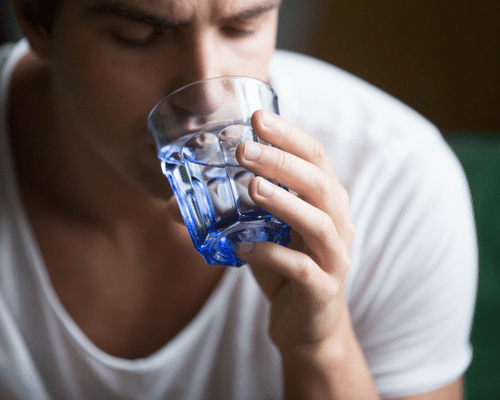
Dehydration is a common withdrawal symptom. Drink plenty of fluids to avoid complications during detox.
Dehydration
Each part of your body needs fluids to function properly. When you lose more fluids than you take in, you may experience dehydration. During detox, dehydration can be dangerous and cause health problems. Therefore, look out for the following signs that your body may be losing too many fluids:
- Excessive sweating
- Vomiting
- Diarrhea
- Constipation
- Feeling thirsty
Do Electrolytes Help Detox?
If you’re displaying any of the above symptoms during detox, the number one suggestion is to drink plenty of fluids to help manage the dehydration. Besides water, drinking fluid with electrolytes may help your body hydrate more quickly. Next, try foods that are good sources of water and will continue to help replenish electrolytes, like:
- Cucumbers
- Watermelon
- Oranges
- Chicken or vegetable broth
- Jello
Related story: 7 Best Foods for Alcohol Detox
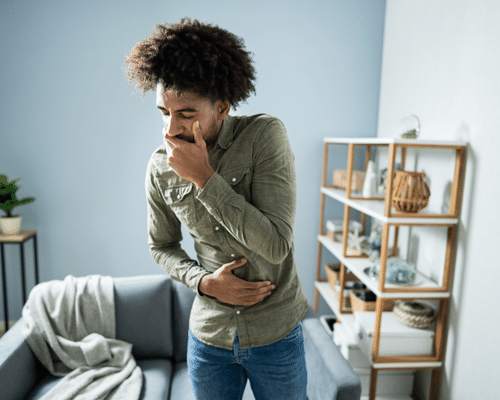
Detoxing can make you feel nauseous or have an “upset stomach.”
Nausea and Vomiting
Detox can give you feelings of nausea, also known as “upset stomach.” Nausea can lead to vomiting, another common withdrawal symptom that involuntarily forces you to throw up when your stomach becomes unsettled. Vomiting causes you to lose electrolytes and become dehydrated. For that reason, it’s important to replace fluids and electrolytes during this time.
First, try drinking small sips of water to help rehydrate your body and digest your food once you’re ready to start eating. Then, try bland foods that won’t irritate your stomach. The BRAT diet is a common nutrition recommendation to help treat nausea and vomiting. It stands for the following foods:
- Bananas
- Rice
- Applesauce
- Toast
The blandness of the BRAT diet is easy on the stomach, which is important if you’re nauseous during detox. Bland foods are easier to digest, give your stomach an opportunity to rest and produce less stool. The goal is to ease your body back into a well-balanced diet while your body gets the nutrients it needs.
If you’re detoxing and experience vomiting for more than two days, find medical care. Call Landmark Recovery at 888-448-0302 for professional support in finding the right medical assistance.
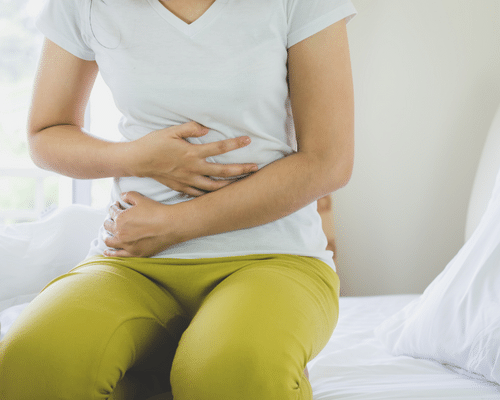
Opiates slow muscle function and lead to constipation. Detoxing reverses the effects of opiates, which leads to diarrhea.
Diarrhea
During detox, some people experience diarrhea as their bodies’ way of trying to self-regulate. The reasoning can vary depending on the substance they’ve taken. For example, people who use opiates likely experience constipation because opiates slow down muscle movement, including the muscles that make up the digestive tract. When a person stops using opiates, their body tries to counterbalance through detox. That’s when they experience the opposite of constipation – diarrhea. This opioid withdrawal symptom can cause a person to lose fluids and risk becoming dehydrated.
If your detox causes you to experience diarrhea, it’s important to drink plenty of fluids and replace electrolytes in your body to help avoid dehydration and further complications. Then, try low-fiber food options that are easy on your digestive tract, like:
- The BRAT diet (bananas, rice, applesauce. toast)
- Mashed potatoes
- White bread
- Well-cooked vegetables
During detox, it’s important to give the muscles in your digestive tract a rest as your body heals and returns to its normal functionality. Eating softer, low-fiber foods is one way for your body to slow digestion and allow your stool time to form so that you can have a normal bowel movement.
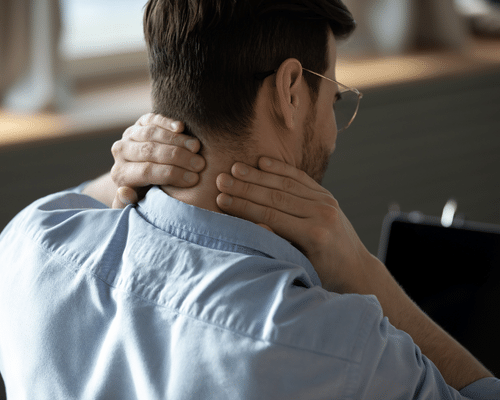
During detox, drink plenty of fluids and eat softer foods to give your stomach muscles rest during digestion.
Muscle cramps
Muscle cramps are painful contractions of your muscles or a part of the muscle. During detox, they can happen whether you’re hydrated or dehydrated. However, dehydration can make muscle cramps more uncomfortable on your body, so try drinking as many fluids as you can to help ease any soreness.
Once you’ve hydrated your body as much as possible during detox, try replenishing your electrolytes with foods containing potassium and magnesium. These two electrolytes can help ease cramping. Here are a few examples:
Potassium-rich foods
- Bananas
- Avocados
- Melons
Magnesium-rich foods
- Mashed sweet potatoes
- Beans
- Lentils
Detox is the first step to addiction recovery
When it comes to detox, drinking plenty of fluids followed by a nutritious diet are changes that may help you manage the symptoms of withdrawal. However, if your symptoms last more than a week after you change your diet and you find it hard to resist your drug or alcohol cravings, consider consulting a medical professional about other forms of addiction treatment.
At Landmark Recovery, we encourage people struggling with addiction to try inpatient rehab. Also known as residential treatment, inpatient rehab allows patients to stay at our facility for up to 35 days. There, they’ll be placed in a safe environment free of triggers and distractions.
Where should you detox?
Medical professionals advise people in recovery to detox and stabilize their bodies at a rehab center. That way, addiction experts have the opportunity to monitor patients around the clock. If a patient’s withdrawal symptoms become too severe, a group of trained staff is there to give them the appropriate detox medication.
Once a patient’s body stabilizes, they have the option to enter residential treatment for up to 35 days, where they’ll be surrounded by an environment free of triggers and distractions from the outside world.
Can I detox at home?
Detoxing at home is possible, but risky. You are exposing yourself to the unpredictable effects of withdrawal from drugs or alcohol. We wrote more about the dangers of an at-home detox.
Even if you’re staying hydrated and eating healthy foods, detoxing without medical supervision leaves you defenseless against more severe withdrawal symptoms. We want to make sure you have all the information you need on detox. If you or someone you know struggles with excessive drinking, illicit drugs, or opioid abuse and you’re looking for treatment options, call 888-448-0302 to speak to an addiction expert at Landmark Recovery.

Choose Recovery Over Addiction
We're here 24/7 to help you get the care you need to live life on your terms, without drugs or alcohol. Talk to our recovery specialists today and learn about our integrated treatment programs.

